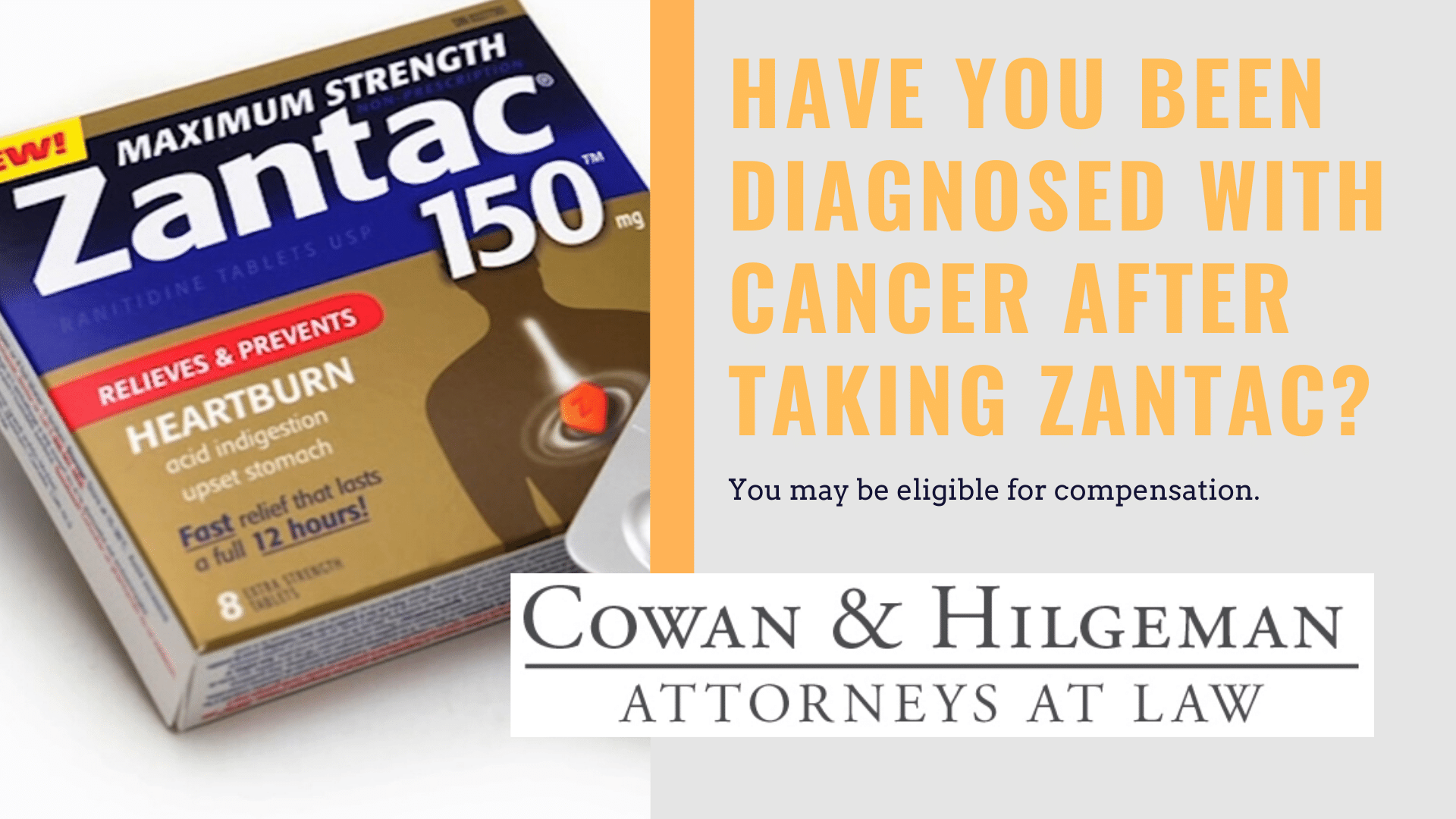Evaluating Eligibility for a Zantac Legal Claim
There has been controversy in recent years concerning an active ingredient in the medication Zantac, as a lawyer who specializes in Ohio Zantac lawsuits is highly familiar with. If you have been a regular user of Zantac and are concerned about its potential harmful effects, you may be eligible to file a Zantac claim. In this article, we will highlight four signs that indicate you may have grounds for pursuing legal action against the manufacturers of Zantac.
Cancer Diagnosis
A key reason that Zantac claims are filed is the possible link between the medication and many types of cancers. Research has suggested that Zantac contains a probable human carcinogen known as N-nitrosodimethylamine (NDMA). NDMA is believed to be formed as a byproduct during the breakdown of ranitidine in the body. If you have been diagnosed with cancer, particularly stomach, bladder, liver, kidney, or colorectal cancer, and have a history of Zantac use, it could be a sign that you should explore filing a claim.
Prolonged Zantac Use
Another sign that you may be able to file a claim is if you have been using Zantac for a long period of time. The longer the duration of Zantac use, the higher the potential risk of adverse health effects. If you have been a frequent user of Zantac for months or even years, it could be worth considering a claim, especially if you have experienced health issues related to the use of the medication.
FDA Recall
In April 2020, the U.S. Food and Drug Administration (FDA) requested the immediate withdrawal of all prescription and over-the-counter Zantac products from the market due to concerns about NDMA levels. The recall came after independent laboratory testing revealed significant amounts of NDMA in certain samples of ranitidine-containing products. If you have been already aware of the recall and continued to use Zantac and later developed health problems, it can be an important factor considered to support your claim
How Can Cowan & Hilgeman Help?
If you or a loved one has been diagnosed with the above described cancers after taking Zantac (Generic: ranitidine), Cowan & Hilgeman may help victims recover damages for:
- Medical costs
- Lost wages
- Pain and suffering
- Disability or permanent injury
- Punitive damages
- Wrongful death
What Products Contained Ranitidine?
Although the drug is best known as Zantac, several variations and generic versions have been on the market. All of the following products contain the active ingredient ranitidine:
- Acid Control (ranitidine)
- Acid Reducer (ranitidine)
- Heartburn Relief (ranitidine)
- Wal-Zan 150
- Wal-Zan 75
- Zantac 150 Maximum Strength
- Zantac 150 Maximum Strength Cool Mint
- Zantac 150 Tablets
- Zantac 75 Tablets
The Zantac Lawsuit Claims That Zantac Can Be Contaminated With the Cancer-Causing Substance N-Nitrosodimethylamine (NDMA)
If you or a loved one has been treated for the following kinds of cancer after taking Zantac (Ranitidine), call us immediately.
Stomach Cancer
Stomach cancer begins when cancer cells form in the inner lining of your stomach. These cells can grow into a tumor. Also called gastric cancer, the disease usually grows slowly over many years.
Small Intestine Cancer
The types of cancer found in the small intestine are adenocarcinoma, sarcoma, carcinoid tumors, gastrointestinal stromal tumor, and lymphoma.
Colorectal Cancer
Colorectal cancer is a cancer that starts in the colon or the rectum. These cancers can also be named colon cancer or rectal cancer, depending on where they start.
Esophageal Cancer
The most common types of esophageal cancer are adenocarcinoma and squamous cell carcinoma. These two forms of esophageal cancer tend to develop in different parts of the esophagus and are driven by different genetic changes.
Liver Cancer
Liver cancer includes hepatocellular carcinoma (HCC) and bile duct cancer (cholangiocarcinoma). Risk factors for HCC include chronic infection with hepatitis B or C and cirrhosis of the liver.
Prostate Cancer
Prostate cancer usually grows very slowly, and finding and treating it before symptoms occur may not improve men's health or help them live longer.
Pancreatic Cancer
Pancreatic cancer can develop from two kinds of cells in the pancreas: exocrine cells and neuroendocrine cells, such as islet cells.
Leukemia
Leukemia is a broad term for cancers of the blood cells. The type of leukemia depends on the type of blood cell that becomes cancer and whether it grows quickly or slowly.
Non-Hodgkin Lymphoma
Non-Hodgkin lymphoma is a type of cancer that develops in the lymph system. The lymph system is part of the immune system. It helps protect the body from infection and disease.
Multiple Myeloma
Multiple myeloma is a cancer that forms in a type of white blood cell called a plasma cell. Multiple myeloma causes cancer cells to accumulate in the bone marrow, where they crowd out healthy blood cells.
Bladder Cancer
Bladder cancer is a disease in which malignant (cancer) cells form in the tissues of the bladder, most commonly, the lining.
Kidney Cancer
The main types of kidney cancer are renal cell cancer, transitional cell cancer, and Wilms tumor.
Thyroid Cancer
There are four main types of thyroid cancer. These are papillary, follicular, medullary, and anaplastic.
Breast Cancer
Breast cancer is the second most common cancer in women after skin cancer. Mammograms can detect breast cancer early, possibly before it has spread.
Testicular Cancer
Testicular cancer most often begins in germ cells (cells that make sperm). It is rare and is most frequently diagnosed in men 20-34 years old.
Frequently Asked Questions
Why Is Zantac Dangerous?
Although the FDA advisory states that the level of contamination is "low", levels of NDMA have been found to be between 3,000 and 26,000 times higher than what the agency has determined to be 'safe'. Scientific research has demonstrated a clear link between ranitidine, the active ingredient in Zantac, and NDMA. Specifically, when ranitidine comes in contact with water, it creates a chemical reaction that causes the formation of NDMA.
What Is NDMA?
NDMA is an environmental contaminant found in water along with meat, dairy, and vegetables. It’s classified as a B2 carcinogen, meaning it’s a probable human carcinogen. Exposure to high amounts of NDMA is thought to cause gastric or colorectal cancer, according to the World Health Organization. It’s extremely toxic to the liver. Even small amounts may be linked to liver damage.
The chemical was once used to make rocket fuel. Today the chemical is only used for research purposes in the United States, according to the Environmental Protection Agency. It’s also a byproduct of many manufacturing processes at industrial sites, including tanneries, pesticide manufacturing plants, and rubber and tire manufacturers. The chlorination of drinking and wastewater, which treatment plants do to purify our water, can unintentionally create NDMA as well.
Help Is Available
Having a healthcare professional to evaluate your medical history and share their findings is especially important in a Zantac claim. Discuss your concerns with a trusted physician, oncologist, or gastroenterologist who is aware of the potential risks associated with Zantac. If they determine that your health issues are likely linked to the use of Zantac or the presence of NDMA, it can strengthen your case significantly.
Filing a Zantac claim can be a complex legal process, but if you identify with any of the signs mentioned above, it may be worth exploring your options. Remember, each case is unique, and it is essential to consult with a qualified attorney experienced in handling pharmaceutical lawsuits. They can evaluate your situation, gather necessary evidence, and guide you through the legal proceedings. To find out more information about how a lawyer from Cowan & Hilgeman can assist you with a Zantac lawsuit, set up a consultation right away to receive legal counsel.
Client Review
"I can not thank Mr. Jack R. Hilgeman, Michelle and Amy. For taking my case.. Their professionalism and kindness was so appreciated. From the first visit I just knew I could trust that my case was in good hands. Many thanks to them. God bless them."
- Janet Osborne-Hicks
![]()

